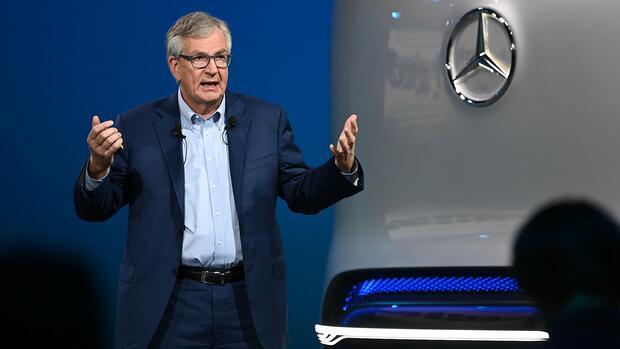The CEO warns of the strengthening of the Alternative for Germany (AfD).
(Photo: dpa)
Berlin Daimler Truck boss Martin Daum has warned urgently about the negative effects of a strengthening of the AfD on the German economy. “We are a global company, of course an upsurge in nationalism in Germany will harm us out in the world,” Daum told Focus magazine. “If we only see the bad guys around us, outside our borders, the enemy – then this attitude has always led to disaster.”
The AfD has recently achieved ever higher poll numbers. Nationwide, several institutes now see the party at between 19 and 23 percentage points. In eastern Germany the values are significantly higher. Elections will take place in Brandenburg, Saxony and Thuringia in September 2024 – and in all three federal states the party is currently by far the strongest political force in surveys.
The AfD’s current soaring is also leaving its mark at the federal level. The three coalition parties together are now far from a majority. Even the strongest government party, the SPD, is not only far behind the strongest opposition force, the CDU/CSU – the Social Democrats have even been pushed out of second place by the AfD.
Daum attributes the strong popularity of the party, which the Federal Office for the Protection of the Constitution has classified as a suspected right-wing extremist case, to great dissatisfaction with current government policy. “The AfD has no idea, let alone a solution. But it takes advantage of the anger and resentment, creating the illusion that everything used to be better,” he said.
“But seriously,” added the CEO of the commercial vehicle manufacturer, “who wants to go back to the world of yesterday? I don’t want to live like my grandmother.” Given the current social climate, he doesn’t envy any politician in government.
Forsa boss Güllner on the rise of the AfD: “The mood among the population is extremely serious”
“On the one hand we want to save the world, on the other hand we want to save Germany as a business location – and the sides are irreconcilable,” explained Daum. They also want to fight climate change, but it shouldn’t cost anything. “Nobody wants to fundamentally change their behavior either.”
>> Read also: How economists evaluate the AfD’s economic proposals
However, climate neutrality means that everyone either has to limit themselves or accept higher costs. “We have to endure that,” emphasized the CEO. “Of course, this leads to the question: How do we get this done without the people rebelling?” Daum added. “It’s very annoying for me when the reaction is: Then we’ll just vote for AfD.”
The popularity of the party could increase significantly. Forsa boss Manfred Güllner believes further gains are possible for the AfD from the rapidly growing group of dissatisfied non-voters. “28 to 29 percent of eligible voters would currently not vote for any party. There is a risk that these dissatisfied non-voters will also become AfD voters,” said Güllner to the Düsseldorf “Rheinische Post”.
The democratic parties have to be “very careful,” warned the pollster. “The mood among the population is extremely serious.” People have the feeling that the parties do not care about what really concerns and worries them in everyday life. “Hence the great alienation between politics in Berlin and the electorate,” explained Güllner.
“Many people have the feeling that things are really going downhill in Germany; they are terrified of social decline.” The economic situation is perceived as very bad. “The traffic light government can no longer sugarcoat this,” Güllner continued. The voting behavior of the Union and FDP together with the AfD in Thuringia will probably further reduce the support for the Union and FDP.
More: These graphics explain the AfD’s boom

